- Home
- Michael Rizzo
The God Mars Book Three: The Devil You Are Page 11
The God Mars Book Three: The Devil You Are Read online
Page 11
“You need to know about us,” he starts. “In the beginning, Casting was voluntary. Great heroes went to make their way outside because the sealed domes would not support all of us. They died scavenging the structural materials we needed to seal and reinforce the domes we hold. They salvaged and repaired the reactors and processors, helped move what we needed inside. Then they helped preserve and foster the great gardens you see out there now. They built the shelters that now house the animals that have come after them—some of them are their legacies, like Two Gun. But they were the best of us, the strongest and bravest. They died in the airless cold, exposed to radiation, miserable deaths, and others gladly went out to continue their work.”
“But those left inside became spoiled,” Kim takes her husband’s story into darkness, showing her own bitterness in the process. “The children of those left, raised in safety bought by the lives of better people, became a culture of cowards. They refused to sacrifice, even to risk going outside to do repairs and gather harvest with the protection of the H-K, and there weren’t enough skilled and willing hands left to keep the colony from breaking down. Because they wouldn’t go, wouldn’t give, we had to leave it to Gardener to decide for all of us: Who could stay, who should be Cast. Even then, confronted with the deaths of us all, those chosen wouldn’t sacrifice.”
“And we started Casting by the gun,” Murphy takes the tale back. “The H-K were empowered to protect the colony. It’s our duty.”
“And a coward shows when death faces them,” Kim justifies. Her attitude—revealed—seems such a stark contrast to her husband’s. But then: he’s the one pushing his fellows outside at gunpoint.
“Some resign themselves,” Murphy gives. “Some try to fight, even stir resistance. It never gets far. I think maybe that’s a better death for some, to be shot fighting back, still inside. It’s why many of us choose Voluntary Termination rather than face the Cast—they would receive an H-K with special rage.”
“Do the existing Cast kill all of your exiles now?” I ask a hard question, testing what Palmer said about the fates of ejected colonists.
“Not all,” he corrects his partner after a moment’s consideration. “They are tried, tested for fighting spirit or anything else that might be of use,” Murphy almost seems to appreciate this. “But most fail, and become their sick entertainment. They do seem to enjoy the screaming of their victims. The majority now are Cast by birth, raised to be vicious, merciless. To survive. We have nothing in common with them anymore. They’re sadistic animals. We’re trying to hold together an ordered society for everyone’s benefit.”
“Did you know the Cast are trading with outsiders?” I risk revealing a potentially critical secret.
“We’ve seen,” he admits. “Food exchanged for more primitive weapons. Like the one that wound up inside Hammond-8. One more reason to keep their numbers down, harvest even when we don’t need the food.”
“If they can trade with outsiders, why haven’t they tried trading with you instead of fighting?” I ask a question that hopefully doesn’t make me sound as naïve as an ETE.
“Too much blood and death between us,” Murphy shoots down. “Too many are from those forced out, not the volunteers. And we don’t defend them when they’re attacked by Siders, unless the Siders try to harm our domes or feed lines. Mostly the Siders want food, but some have been strong enough to almost overrun the Cast. We give subtle help, deploy snipers, reduce their numbers with stealth, always careful not to reveal our existence. The Siders are better believing only the Lower Dome is viable.”
“Are there still powerful Sider groups?” I want to know.
“The Desert Men came openly, offered trade, but only after their raids failed for many years,” he tells me about the Nomads, the Melas Food Traders. “The Desert Men are the first to try this new tactic, but only because they seem to be weakest, or hold land too far away to come more than occasionally. They don’t seem to care if the Cast are well-armed as long as those arms are not used against them. I doubt other groups would do such a thing, and except for precious survival gear, there is nothing else of value to the Cast to trade.”
“Are the others close enough to fight over territory?” I wonder.
“Not as much over the years. I think many have moved on, elsewhere. Maybe there are greener places.”
“There are,” I let him know. “Mostly east of here. Hundreds of kilometers.”
“Some may have gone that way. I’ve heard stories and seen poor videos of ‘Red Men’—fierce and stealthy fighters painted to match the terrain—but none seen in my lifetime. But we have seen Silver Men.”
I’ve heard that term before. “Silver?”
“They’re covered head-to-toe in thick armor, the weight of which makes them short and thick. Their weapons are primitive, except for gas-propelled harpoons and grenades. Thankfully, they only come every few years, but they seem to want the dome more than the food inside.”
“Any idea where they came from?”
“The armor and weapons of their dead are prized by the Cast. It appears to be new manufacture, handmade. We’ve never managed to acquire anything that could identify a colony of origin. But the Cast likely have many trophies we haven’t seen.”
“I guess I’ll have to ask them,” I think out loud.
“The Cast only answer questions with blades,” he warns me.
“I’ve noticed.”
Our conversation gets cut off by an ominous deep chime—like a Buddhist temple bell—echoing through the PA. Then Gardener’s droning vox:
“MANDATORY TOWN HALL MEETING. ALL RESIDENTS. THIRTEEN HUNDRED HOURS.”
Fifteen minutes from now.
“Is that about me? Or did Palmer make good on his posturing?” I wonder out loud.
“Probably both,” Murphy admits heavily. Ara and Kara look freshly re-terrified. (Kim almost looks smug.)
I try diving into Gardener to see what’s on the agenda, but find new encryptions. The only things I can access are general monitors. I see the population of the sealed domes begin moving toward the Town Hall.
Time to see what kind of a god I’m going to be.
Apparently not a god of good timing:
I make my “entrance” while the residents are still gathering, getting seated. This results in some awkward pausing and shuffling, congesting the process while they stop to stare at me and/or get as far out of my way as possible. (I was thoughtful enough not to wear the Halloween helmet, but I almost feel like I should be wearing a big flowing cape like a fantasy hero or villain.) I walk through the middle of them as politely as they’ll let me, then find myself standing up in front of the gallery of H-K chairs like a nervous groom, waiting.
Murphy has disappeared without a word after walking with me to the entrance steps. I understand why once the civilians finally get settled (or as settled as they can be with me standing up here with a gun and a sword): the H-K do make good entrances. Gardener chimes the ominous bell again, and everyone falls silent. Then the H-K file in from the front of the hall, military precise, and take their assigned seats. Their families file in next, standing behind them at disciplined attention, even the small children.
The color contrast that divides their society is strikingly clear now. The civilians are all dressed in pale, well-worn work jumpsuits: dingy white, faded blue and green and orange (indicating job assignment or value?). The “serving” H-K are all in their black and gray L-A uniforms, all identically armed. Their families uniformly wear black. (I briefly consider changing the color of my surcoat to visually and symbolically separate myself from the H-K—maybe to Mars red—but the effect would probably scare my audience even more than they already are.)
Murphy has his eyes locked on me stoically, just as all of his fellows. I barely see recognition—I’m just another problem to deal with now. (I also can’t help but notice the one vacant seat—probably Dori Hammond’s. Her gun belt has been symbolically hung from the back of it.)
And then I get left standing for several awkward moments while everyone stares at me in absolute silence.
“THANK YOU ALL FOR COMING,” Gardener begins (though manages to sound insincere even with no vocal inflections whatsoever). “AGENDA ITEM ONE: THE ARRIVAL OF THE OUTSIDER IDENTIFIED AS U.N.M.A.C. COLONEL MICHAEL CARL RAM.”
A theater screen extends down behind the H-K, and I get to stand around some more as Gardener replays video of my “capture” and “interrogation” in Medical, and then right here in the Hall. I notice it edits out the parts where Murphy and Palmer fill me in about life in the colony, defend their survival protocols with their history. I also notice it edits out the part when I tell them their colony systems will be dead in a few years. Otherwise, I’m actually impressed that it’s willing to share the Chang/UNMAC threat so openly.
“A MOMENT OF GRATITUDE FOR H-K PALMER-6, H-K MURPHY-7 AND H-K HAMMOND-8 FOR THEIR BRAVE SERVICE.”
I feel like I’m in church. Everyone lowers their eyes like they’re praying. I count a full minute. Then:
“OPEN DISCUSSION. RULES OF ORDER IN EFFECT.”
Palmer stands.
“The evidence of a potential UNMAC incursion is substantiated,” he tells the masses like he’s running for office. “We have the bodies of UNMAC soldiers and sightings of aircraft. Current force strength on-planet is not yet known, but we must assume it will increase. Gardener has run calculations. We cannot confront this threat directly and survive.”
Video shows the UNMAC flyovers, and stills of bodies in H-A armor—men I sent to their deaths. The Hall rumbles with their hushed reactions.
“The evidence of a secondary threat from an unknown superior force is not yet substantiated,” he continues. “Colonel Ram’s fantastic tale cannot be proven. However, Gardener calculates a solution to the UNMAC threat that may address other unknown threats.”
Gardener runs a simulation animation. It begins shockingly with a massive explosion and fire that consumes and destroys the Lower Dome, leaving a barren ruin.
“You’re going to destroy the Lower Dome to convince your enemies that there’s nothing here?” I distill.
“Rules of Order are in effect,” Palmer cautions me, testing my willingness to defy their rituals. “Do not speak out of turn.”
Murphy stands.
“What will be the impact on resources if the gardens are destroyed?”
I’m initially disappointed that his first question isn’t about killing all of the Cast, but then I see where he may be going: Gardener puts up its calculations. Over a hundred colonists would have to be culled within the following months to maintain sustainability. The Hall is absolutely silent, struck numb. (I wonder how they would react if Gardener showed the names of those it was planning to eliminate for the greater good.)
“This would not be Casting,” Palmer makes a poor effort. “This would be merciful termination.”
I make a poor effort to observe their rules, holding up my hand like a schoolboy.
“The Outsider may speak with respect,” Murphy allows me before Palmer can protest.
“UNMAC has already seen your H-K,” I let them know. “The cameras on those suits of armor were still live when you took them. And the ETE have confirmed that your feed lines are drawing resources. Even if you found a way to do without the oxygen, water and fuel coming in, UNMAC has been using ground-penetrating sonar to discover buried facilities—yours isn’t the only colony that’s tried to hide. They believe this place could be a source of deadly nanotech or biotech infection—they will dig you out even if they think you’re all dead, just to be sure.”
“But it may convince this ‘Chang’ you tell of to leave us be,” Palmer defends a plan he’s apparently fully behind. “You say he only wants food and manpower. He will find neither. And then he will move on to engage the Unmakers. They will be too busy to come digging for us. Perhaps he will even defeat them, if he is a powerful as you say.”
I hold up my hand again. It seems to annoy him.
“Speak.”
“And what future does that give you? You’ve managed to survive for half-a-century, maintain a society. Hiding under a mountain with no outside gardens… How long will you last?”
I wait for Gardener to put up more cold calculations, but it doesn’t. The screen stays blank. I tell them why:
“As is, your systems will fail within a decade. I’ve accessed Gardener. Your colony is dying. You need outside help to stay alive.”
“ORDER VIOLATION,” Gardener chastises me. “FIRST WARNING.” Apparently it didn’t like me using the truth as a weapon any more than Burns did. (Is that the kind of god I’ll be?)
“You will follow the Rules,” Murphy warns me. But then he sort-of speaks for me again, specifically addressing Palmer. “The Outsider also knows of us. Has that been calculated?”
Gardener replays the Lower Dome demolition, this time zooming in on an almost-funny graphic of a cartoon me disintegrating in the center of the blasting.
I hold up my hand again, but don’t wait for acknowledgement.
“I don’t think that will kill me. It will, however, be quite the setback in our relationship.”
“ORDER VIOLATION. SECOND WARNING.”
“How many do I get?” I devolve to smartass.
“Silence!” Murphy warns me, full-authoritarian, but I get the impression he really is trying to help me.
An older H-K—his name strip reads “Chan-4”—stands up.
“Does our bizarre guest have a better solution to offer?”
I really do appreciate the opening, but I’m still irritated enough to play obstinate, keeping my silence until I’m given permission to
“Speak, if you have anything of value to say,” Palmer is actually the one to insist.
“All right. But first I want to say that I have not come to judge you. You have done whatever you have done because you had few to no choices, to survive, and you have. But now you may have choices. I may be able to advocate for you with UNMAC, get them to reconsider their plans to take your homes from you. I will even fight them if necessary. They can provide you supplies, equipment to repair your systems, restore and increase colony functioning.
“Another choice may be the ETE. I understand your impressions of them from past encounters, but they have changed in response to the new threats to this world. They have the tools and the skills to help defend you against both UNMAC and Chang. Two of their Stations are in reasonable proximity. They have also been willing to provide raw materials from their nano-factories. You could repair the Lower Dome, improve your living conditions, expand.”
“Are you supporting the plan to eliminate the Cast presence?” Chan asks, mildly incredulous.
“I am not,” I tell them. “In the options I’m giving you, you would have to make peace with the Cast, cooperate with them. I believe I can help make that possible. You both stand to benefit, and you both face the same threats. You need to stand together.”
I get a lot of grumbling from the entire Hall. The H-Ks seem particularly upset by my suggesting any kind of peace, enraged. I catch the look on Kim’s face as she glares at me like I’ve threatened her family, her way of life. Murphy, to his credit, looks torn. I think I see the same look on a few others, but only a few. The civilians only look terrified.
I hold up my hand again, and again don’t wait for permission.
“I will tell you this: If you proceed with the plan to exterminate the Cast, you will have no assistance from UNMAC or the ETE, or from me. At best, you will be left to your fates.”
“And at worst?” Chan asks me levelly. “Would you attack us?”
“As I said: I am willing to accept what you thought you had to do when you had no better choices. If you choose to keep killing when you have choices presented to you, then my understanding will be at an end. At best, you will be left to your fates. But I will not allow you to commit genocide.”
I guess I’m going to be this kind of god.
The
Hall threatens to come apart on me. Even the generally sheepish civilians are starting to show their outrage. Some actually get bold enough to come out of their seats. I can hear panic in their protests. They don’t seem to think the Cast can be more than brutal animals.
“Rule of Order!” Murphy shouts. (I notice Gardener doesn’t interrupt the chaos—perhaps it wants its population wound up.) He manages to get enough volume reduction to confront me himself: “You threaten to enforce peacemaking on us. What if the Cast refuse peace?”
He’s trying to be the voice of his people.
“You have the right to defend yourselves, your families and your homes,” I try to reassure. I realize I sound like I’m rewriting their laws. “I will help you deal with the Cast. If they truly won’t accept a truce, then they will have to deal with me.”
“And if they prove to you what savages they are, will you help us drive them from our gardens?” Palmer provokes. “Or will you stay forever—standing between us—to ensure this peace you want?”
“I can’t answer that until we try,” I tell him for lack of a proper answer. “I’m only asking that you try.”
Palmer grins in wicked victory, confident I’ve done the opposite of selling my proposal. The Hall begins rumbling again as the civilians begin digesting what I’ve threatened them with. Only the H-K remain stoic (including the families, which is impressive).
“RULE OF ORDER,” Gardener drones. “DISCUSSION IS CLOSED.”
“We would like to thank our visitor for his presentation,” Palmer oozes. “We will take what was said under consideration while Gardener calculates our best course. Now we must move on to other pressing business.”
“AGENDA ITEM TWO: CASTING REVIEW. RESOURCE THRESHOLD EXCEEDED. CANDIDATES FOR REVIEW: PRIMARY: KARA COLE. ALTERNATE: HAMMOND-8.”
Now the H-K get restless. A few know to look to Palmer for instigating this. The others seem to quickly pick up the cue. But the group looks divided on whether this is distressing or just routine.
The civilian crowd, however, has all gone tense. I try to find Kara in the masses. Her mother is holding her tightly, both wide-eyed and trembling. The slight man I assume is her father sits by them in resigned shock.

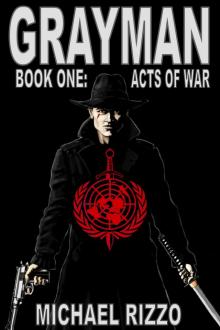 Grayman Book One: Acts of War
Grayman Book One: Acts of War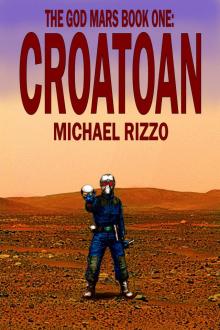 The God Mars Book One: CROATOAN
The God Mars Book One: CROATOAN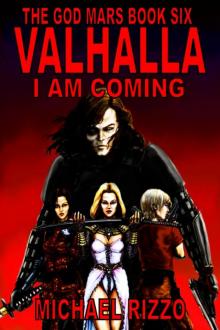 The God Mars Book Six: Valhalla I Am Coming
The God Mars Book Six: Valhalla I Am Coming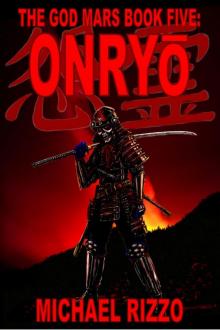 The God Mars Book Five: Onryo
The God Mars Book Five: Onryo The God Mars Book Four: Live Blades
The God Mars Book Four: Live Blades The God Mars Book Two: Lost Worlds
The God Mars Book Two: Lost Worlds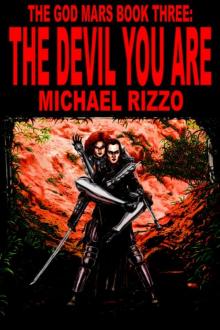 The God Mars Book Three: The Devil You Are
The God Mars Book Three: The Devil You Are